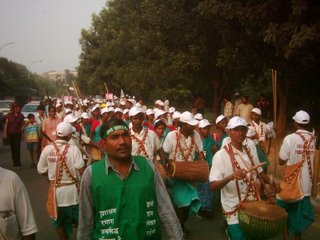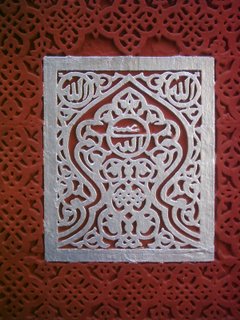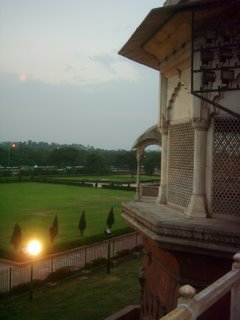 I admit I'm becoming a compulsive blogger. I dedicate a few minutes to hours creating posts and looking at other blogs. I take pictures keeping in mind the blog entries I can make with them… Things aren’t very interesting at the moment apart from Saket being here for a few days. Herez one of his pictures... Saket works for a prominent newspaper and was here for a training session. The first morning I met him at the station and we went to the FIRC for a hot cuppa coffee. A good conversation on what I'm missing not being in Poona was followed by me and him going to his guest house in ChanakyaPuri, a posh New Delhi locality full of embassies and expats. Saket was given a beautiful room on the bungalow’s roof… with a lovely garden view and some colourful flowers. It cold and he didn’t had ne winter outfits so initially we decided to go to Sarojini Nagar but later we replaced it with a trip to old Delhi for a lunch at Karim’s. A few from roof of bungalow where Saket stayed...
I admit I'm becoming a compulsive blogger. I dedicate a few minutes to hours creating posts and looking at other blogs. I take pictures keeping in mind the blog entries I can make with them… Things aren’t very interesting at the moment apart from Saket being here for a few days. Herez one of his pictures... Saket works for a prominent newspaper and was here for a training session. The first morning I met him at the station and we went to the FIRC for a hot cuppa coffee. A good conversation on what I'm missing not being in Poona was followed by me and him going to his guest house in ChanakyaPuri, a posh New Delhi locality full of embassies and expats. Saket was given a beautiful room on the bungalow’s roof… with a lovely garden view and some colourful flowers. It cold and he didn’t had ne winter outfits so initially we decided to go to Sarojini Nagar but later we replaced it with a trip to old Delhi for a lunch at Karim’s. A few from roof of bungalow where Saket stayed...

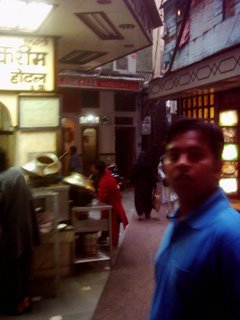 Karim is not a hotel it’s a landmark. Being an average Delhite you might not even know it exists. Especially people from city’s suburb don’t like to visit this part of the town known for its visible Muslim population, crowded roads, stinky corner and well...Jama Masjid... here another picture of me and Saky posing outside the mosque I was denied entry to...saying it was prayer time.
Karim is not a hotel it’s a landmark. Being an average Delhite you might not even know it exists. Especially people from city’s suburb don’t like to visit this part of the town known for its visible Muslim population, crowded roads, stinky corner and well...Jama Masjid... here another picture of me and Saky posing outside the mosque I was denied entry to...saying it was prayer time.
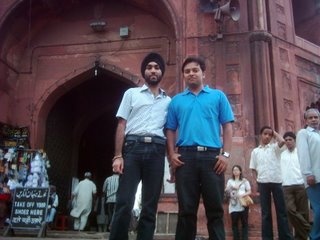
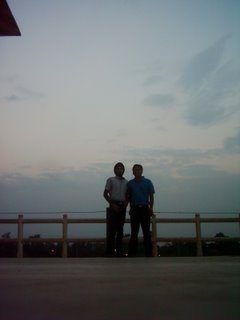
Though time did not permit but we did go to see the Red Fort but were put off by the huuuuuuuuuuuuuuuuge line. So while Saky stood in the entrance line I stood at the ticket counter. While inside we talked about various things amongst them, the effect of Mugal invasions on 'Hindu' India. Saket said that in many cases when talking of art and architecture, the Mugals were much advanced than the indigenous people, to which my replied was that not only were the forts and palaces the Mugals built were built much later but also that Hindu art was as sophisticated during the Hindu Renaissance (but that was centuries ago). The Hindu renaissance period, by the time the Mugals came had vanished. That was one of the reasons why the Mugals established their superiority.
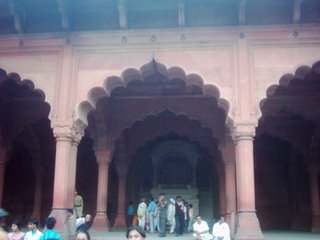 During its peak the Hindu empire (I know many would argue that there exists nothing like the Hindu empire.) but i refer Hindu empire to the time predominantly of the hay days of the empires (mostly ruled by Hindu rulers), which was the last millennium. The Hindu art flourished, it was an era of inventions, importance was given to education and there was an effort to build an egalitarian society. Women shared an equal status in the society and stress was given on rationality and sharing of knowledge. I have often believed that a civilization (or in these time a nation state) achieves its peak when it strives a perfect balance between spirituality and modernity. I'd like to expand a little more on this point. What I mean by the terms spirituality and modernity here is spirituality which makes us see beyond what is apparent and logical. It’s an inner consciousness by which we can judge our actions not based on logic but based on "rightness" and "wrongness". It’s mutually exclusive to logic. It’s closer to the concept of "Karma". The result of actions but not seen through the prism of logic, but through moral good or bad. Of course, when I say that I agree that it can be relative. Too much dependence on either of them will lead to a down fall. In today’s time I site the west as an apt example, in the past I site the Islamic and Hindu civilizations. The west reached its peak of glory when there was still some spirituality left, with the decline in the reach of spirituality and increased dependency on logic or reason, the civilizations started to loose its touch. I blame this fact in the fact that even today modern science (basically a fallout of advancement in physics in the eighteenth century) hasn't been able to explain everything through logic, though logic is always an ongoing process. Countries on the other hand, like India and China, were once the cradle of civilizations because of the existence of both spiritual and scientific knowledge and not because of cultural superiority, the moment they lost the delicate balance they lost their status. Later, it was the Islamic civilizations and subsequently the western civilizations. The reason for downfall of Indian and Chinese civilizations was the downfall of logic or rationality or scientific reasoning rather than spirituality in their societies; while on the other hand the reason for downfall of western civilization is the downfall of spirituality and dominance of logic (It also draws many of them to the east these days). I explain the phenomenon by drawing the example of Scandinavian societies, all of whom are viewed as "model societies" when viewed from Euro centric standards. Apparently, though these societies are ideal, many of them face serious social problems (suicide, alcoholism, psychological violence, etc. There is no law for the last even in these modal societies. In other words there is no psychological aspect to the prevailing laws. Anything which cannot be explained with logic has no provision for punishment in the eyes of the law. It is for this reason that I don't see these societies as a model for other "less developed" societies.
During its peak the Hindu empire (I know many would argue that there exists nothing like the Hindu empire.) but i refer Hindu empire to the time predominantly of the hay days of the empires (mostly ruled by Hindu rulers), which was the last millennium. The Hindu art flourished, it was an era of inventions, importance was given to education and there was an effort to build an egalitarian society. Women shared an equal status in the society and stress was given on rationality and sharing of knowledge. I have often believed that a civilization (or in these time a nation state) achieves its peak when it strives a perfect balance between spirituality and modernity. I'd like to expand a little more on this point. What I mean by the terms spirituality and modernity here is spirituality which makes us see beyond what is apparent and logical. It’s an inner consciousness by which we can judge our actions not based on logic but based on "rightness" and "wrongness". It’s mutually exclusive to logic. It’s closer to the concept of "Karma". The result of actions but not seen through the prism of logic, but through moral good or bad. Of course, when I say that I agree that it can be relative. Too much dependence on either of them will lead to a down fall. In today’s time I site the west as an apt example, in the past I site the Islamic and Hindu civilizations. The west reached its peak of glory when there was still some spirituality left, with the decline in the reach of spirituality and increased dependency on logic or reason, the civilizations started to loose its touch. I blame this fact in the fact that even today modern science (basically a fallout of advancement in physics in the eighteenth century) hasn't been able to explain everything through logic, though logic is always an ongoing process. Countries on the other hand, like India and China, were once the cradle of civilizations because of the existence of both spiritual and scientific knowledge and not because of cultural superiority, the moment they lost the delicate balance they lost their status. Later, it was the Islamic civilizations and subsequently the western civilizations. The reason for downfall of Indian and Chinese civilizations was the downfall of logic or rationality or scientific reasoning rather than spirituality in their societies; while on the other hand the reason for downfall of western civilization is the downfall of spirituality and dominance of logic (It also draws many of them to the east these days). I explain the phenomenon by drawing the example of Scandinavian societies, all of whom are viewed as "model societies" when viewed from Euro centric standards. Apparently, though these societies are ideal, many of them face serious social problems (suicide, alcoholism, psychological violence, etc. There is no law for the last even in these modal societies. In other words there is no psychological aspect to the prevailing laws. Anything which cannot be explained with logic has no provision for punishment in the eyes of the law. It is for this reason that I don't see these societies as a model for other "less developed" societies.
Pragmatically thinking if I hurt somebody physically on purpose I can be punished by the law but any attempt by me to hurt somebody psychologically will not be seen in the eyes of the law as a crime. In other words there is no way to measure "mental hurt". This is the reason why I do not feel the Eurocentric model to be an ideal way to measure things like prosperity. The model can only measure things that can actually be seen or felt by the five human senses. Anyting beyond the five senses is unknown to modern science but well-known to spirituality. The only way to gauge perceptions is through the five senses, but I view it as an absence of "humaity" in it. I’m a firm believer that there's more to humans, which modern science cannot explain. And this, I believe, is the reason why eastern perspectives MUST be incorporated in international organizations It will not only make them popular with the developing world but also the Developed world. But the sad fact is that many of the people who have the power to change things are so drenched in the philosophy of logic that it’s almost impossible for them to see the world in prospective beyond the western logic for many of the answers. It has been embedded in them so much so that even if they want to they cannot think beyond it, though a part of it is also to be blamed on the "system" we have created based solely on logic. The concept of a Corporation (also a movie) is only a tiny bit of it (of which I shall talk about later).
Amitava Kumar
I first came to know about Amitava Kumar when I was in third year of my college. The British Council organized a book reading session after the launched of his new book - Bombay London New York. I went to the British council’s reception to inquire about the programme. While I was trying to grab the receptionist's attention, a man with baggy cargos and red t-shirt walked in. The man walked up the reception and asked something to which the receptionist smiled while I stared standing at the other end. While the man was still at the reception, I got the guts to ask the receptionist as to where and when the book reading session will take place. The man smiled at the receptionist and she reciprocated, I could sense something... welll...fishy. At the reading session the same man tuned up to read the prose. During the discussion one of my questions to Amitava Kumar was if he started writing because it came to him as a way to vent his feeling during testing times (apparently, he's from Bihar, the state known for corruption, and started writing during his college days in University of Delhi, a similar fashion in which I was introduced to writing). To answer my question he nodded and went on to explain the reasons in detail. Apparently, Amitava is married to a woman of Pakistani decent amongst threats from both Hindu and Muslim right wings.
After the session I bought a copy of the book from the counter outside the hall and was waiting for Amitava to come out from a room adjacent to the main hall where he was talking a lady. I wanted to get the book signed (no I'm not using the word autographed). The moment I saw him I jumped to him with my copy and this is what he wrote on my copy of Bombay London New York... while he was still at it, I asked "How do you know I'm a writer?"... He gave me a conceit smile, moved the book towards (which I grabbed instantly) and went off....

Here's one of the article I found on his blog which I liked reading....
Mistaa Chappell
A lil' bit about that Chappell controversy. A person who initially started as a quality critical coach of the Indian Cricket Team is now just proving to a "Big mouth Ozzie jerk" for the Indian politicians. He reminds me of those lines from Samuel P. Huntington’s book "The Clash of Civilizations"... "...Australians, in contrast, are the most direct, blunt, outspoken, some would say insensative, people in the English speaking world."
While at it Mr. Chappell (I respect his professionalism) drew himself a bit too far though I'm a firm believer he's NOT wrong. But you see the Ozzies (Cricket team) already got a bad reputation for being "uncivilized" when they pushed around the Indian minister Sharad Pawar after wining the Champion's Trophy. Mr. Chappell is just cementing the stereotypes... as Mahatir Mohommed of Malaysia once said dismissing Australia's entry into ASEAN (quoted from the Clash of Civilizations)... " ...But Australia, being European, cultrually, feels that it has a right to tell others what to do, what not to do, what is right, what is wrong. And then, of course, it is not compatible with the group...It's not the colour of the skin, but the cultural".
People of Interest to me...
Amitava Kumar
Edwina Mountbatten
Also, a "cute" video of how Indian IT geeks (apparently) like to party (Caution: contains nudity) hehe...




















